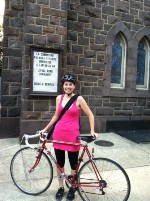Helping an Oasis in the City
 For several weeks, Katie Capelli, MPH, ’12, one of the school’s Opening Doors trainees, has been jumping on her bike and riding through some of the most underserved neighborhoods in Philadelphia. She is mapping local churches and congregations as part of a team of graduates, faculty and staff at the DUSPH that is conducting a community assessment for the Scattergood Foundation, the owner of the Friends Hospital property located in the Lower Northeast. The property is 100 acres of mostly pastoral land running along Tacony Creek, and the hospital and surrounding office buildings occupy less than half the acreage. The team will be presenting the foundation with ideas, generated from secondary data analysis and community input, about how the land could best be used to serve the public health needs of surrounding communities.
For several weeks, Katie Capelli, MPH, ’12, one of the school’s Opening Doors trainees, has been jumping on her bike and riding through some of the most underserved neighborhoods in Philadelphia. She is mapping local churches and congregations as part of a team of graduates, faculty and staff at the DUSPH that is conducting a community assessment for the Scattergood Foundation, the owner of the Friends Hospital property located in the Lower Northeast. The property is 100 acres of mostly pastoral land running along Tacony Creek, and the hospital and surrounding office buildings occupy less than half the acreage. The team will be presenting the foundation with ideas, generated from secondary data analysis and community input, about how the land could best be used to serve the public health needs of surrounding communities.
“The Friends Hospital has been called an oasis in the middle of this community,” said Capelli. “For decades the Friends Hospital has been providing the region with excellent behavioral health services and their surrounding land is a calming presence of green landscape.”
The urban community surrounding the Friends Hospital has seen significant population shifts since the 2000 census and currently encompasses large African American, Latino and Asian communities. These population shifts include the largest percentage increase in poverty in Philadelphia along with dramatic increases in new immigrants, unemployment, and younger families in transition. Similar to many urban areas, residents struggle with obesity, diabetes, hypertension and asthma. Currently, there is only one city-run health center in the area that is stretched beyond capacity and the rate of local residents without health insurance has continued to rise. The need for more women’s health services and oral health care are particularly notable.
Amidst these pressing health needs, the beautiful, largely undeveloped Friends Hospital property sits in the middle of the Lower Northeast; heir to a long history of providing spiritual nourishment and support for behavioral health. The question of how this land might be best utilized as a “therapeutic tool” that supports the health of surrounding neighborhoods is one that motivated the foundation to embark on this community assessment.
“Our public health graduates are playing a major role in this community assessment,” said Rabbi Nancy Epstein, a DUSPH professor and advisor to Capelli whose work identifying congregational assets is one important dimension of understanding community needs and strengths. “We are leading an actionoriented community diagnosis process that analyzes data, maps community assets, and identifies community perceptions about which services are most needed” said Epstein. “Katie’s work is crucial to this process as she learns more about the formal and informal services and supports that congregations provide in these communities.”
Capelli’s focus in this process is mapping local congregations. To date, she has mapped more than 350 congregations of various faiths and sizes in the four zip codes immediately surrounding the Friends Hospital property.
“Many of the churches and congregations provide social services, such as food banks, health education, day care and youth programming.” said Capelli. “In fact, we know from Dr. Ram Cnaan’s landmark research on congregations that most congregations in Philadelphia provide an average of three different types of social services. Their value in the community is critical.” The action-oriented community diagnosis process will continue for several more months.